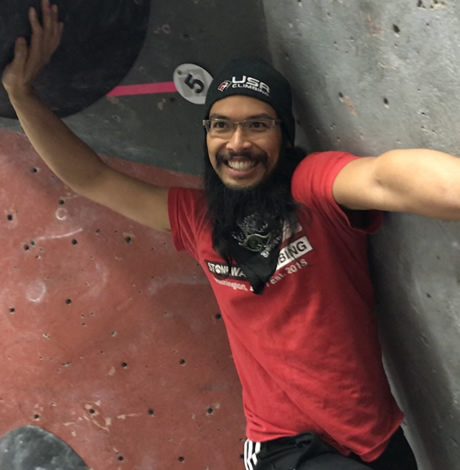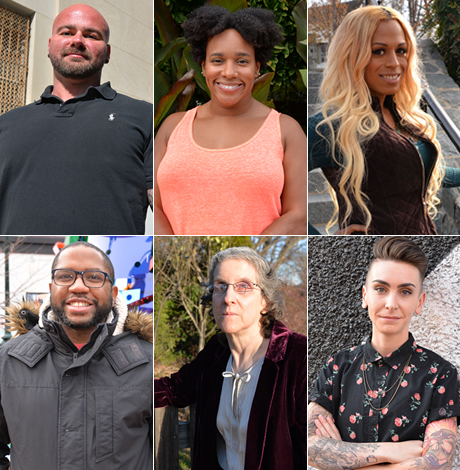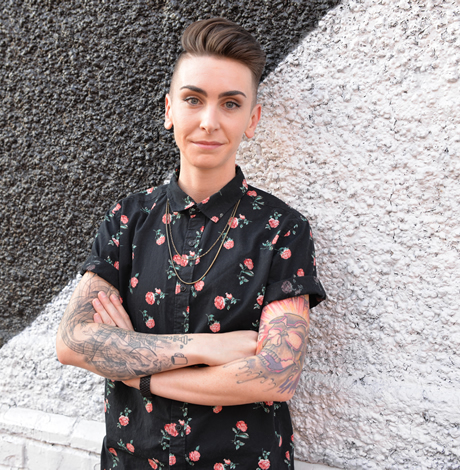Sports
All Stars spotlight: Stonewall Climbing welcomes all genders
Local climbers find athletic challenge, camaraderie in queer league
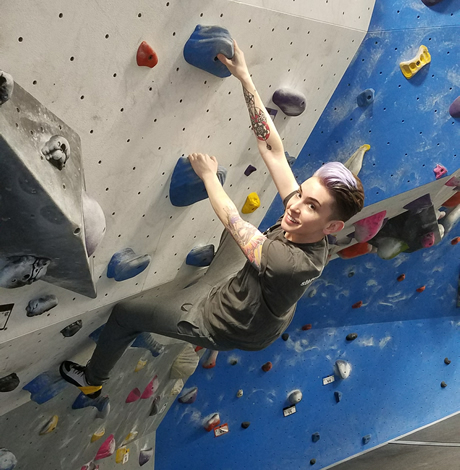
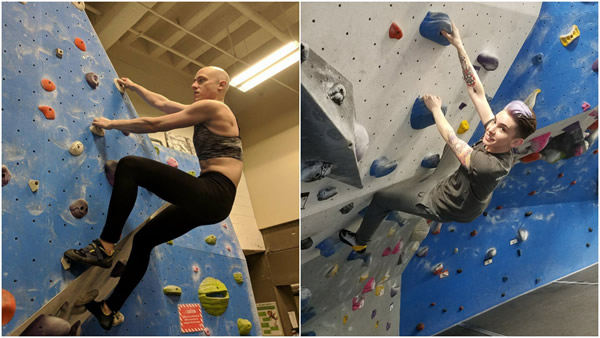
Ari Dolmon (left) and CV Viverito are members of Stonewall Climbing. (Photos courtesy Dolmon and Viverito)
This week in the Washington Blade’s All Star series, we meet two athletes from Stonewall Climbing whose fourth season is starting this week. Registration is still open for limited spots in the season which runs through September. The Stonewall Climbing league offers recreational climbing in a team format.
After moving to D.C. in December of 2015, Ari Dolmon started looking for a rock-climbing option. Even though she had never climbed before, it was an item on her checklist. She gave D.C. Fray Frisbee a try first but didn’t click with any of the players. Now entering her third season with Stonewall Climbing, she has found the niche that she was looking for in D.C.
“I fell in love with rock climbing immediately and the people have been incredibly welcoming. I had been missing that feeling of being connected to something since moving here,” Dolmon says. “I didn’t think it was going to be my thing, but it really has been for the past year.”
Dolmon grew up in Woodstock, Ill., and didn’t play in organized sports except for one attempt at soccer. While attending the University of Illinois she played pick-up frisbee, rugby and soccer along with taking on several hiking trips in Colorado.
She is enjoying the challenges that rock climbing present and finds correlations with her ongoing transition as a transgender woman.
“When you start out in rock climbing, you go through a period of accomplishments and then reach a plateau. You have to develop skills to reach the next level,” Dolmon says. “Through that you are pushing yourself to be a better person and you have teammates that are there to push you along the way.”
After college, Dolmon worked in Israel as an English teacher. Now working as an associate for a law consulting firm, she came to D.C. because of its strong queer presence and a desire to stay connected to the international community. The welcoming space provided by Stonewall Climbing has been integral to her path.
“One of my challenges is that I want other people to see me the way I see myself,” Dolmon says. “Even over time there is always going to be a masculine and feminine dynamic since I identify as a butch woman. I want to be strong, but strong as a woman.”
Every day things such as the type of clothing Dolmon wears are made just a bit easier when she is heading to a session with Stonewall Climbing.
“I just throw on a sports bra and women’s cut clothing. It makes me happy that I can put myself out there and have the full backing of everyone I know,” Dolmon says. “My mental transition is long past; now I am working on the physical.”
CV Viverito enjoys a team environment and believes that sports lead to being more focused and organized in all aspects of life. While they were recovering and doing physical therapy from a soccer back injury, a friend suggested rock climbing as a possible outlet.
“I love having a sport and a team. Rock climbing is individual but not with the team format of Stonewall Climbing,” Viverito says. “The sport is both a physical and mental workout and it gives you a Zen feeling. When I am on a treadmill, I am thinking about my day. When I am on the wall, I don’t have the capacity to think about anything else.”
Growing up in South Brunswick, N.J., Viverito was a three-sport athlete in soccer, softball and basketball. They (a pronoun Viverito uses) switched over to soccer full-time playing on their high school team as well as on a state club team, the Jersey Knights. They played four years of varsity soccer at Muhlenberg College.
Viverito studied abroad in Spain during college and ended up moving there to teach English and work in ESL curriculum for two years. Their first job back in the States was at Human Rights Campaign before taking a career detour at the Art Institute of Washington.
Citing a desire to return to work in the LGBT community, they are now working as an international programs manager with the Victory Institute.
Soccer was still their sport of choice in D.C. and they played with the Washington Area Women’s Soccer League before discovering rock climbing. The environment at Stonewall Climbing has been a welcoming experience and this will be their third season with the league.
Viverito identifies as non-binary and/or genderqueer.
“The last time I played organized soccer was four years ago and I wasn’t out as genderqueer,” Viverito says. “It is no big deal at Stonewall Climbing because the teams aren’t divided by gender. I don’t really have to think about it.”
The leadership of Stonewall Climbing has been encouraging more diversity in the league in the hopes that it will increase the levels of understanding among the athletes and the staff at the rock climbing gyms. There is also outreach and social events with other climbing groups including Brown Girls Climb and Brothers of Climbing.
Recently, some of the gym management sat down for a conversation initiated by Stonewall leadership and facilitated by Viverito.
“We discussed topics such as respectful language, commonality of language, appropriate questions, locker rooms and facilities,” Viverito says. “It was great, and the gym staff learned a lot.”
Viverito started as a beginner and says they are at an intermediate level now and feeling more comfortable on the wall every week. The safe space offered at Stonewall Climbing has allowed them to thrive in their new sport.
“I am in spaces in life where I am not comfortable and that is not the case at Stonewall Climbing,” Viverito says. “It’s a great feeling just getting on the Metro knowing I am heading to climbing.”
Sports
Attitude! French ice dancers nail ‘Vogue’ routine
Cizeron and Fournier Beaudry strike a pose in memorable Olympics performance

Madonna’s presence is being felt at the Olympic Games in Italy.
Guillaume Cizeron and his rhythm ice dancing partner Laurence Fournier Beaudry of France performed a flawless skate to Madonna’s “Vogue” and “Rescue Me” on Monday.
The duo scored an impressive 90.18 for their effort, the best score of the night.
“We’ve been working hard the whole season to get over 90, so it was nice to see the score on the screen,” Fournier Beaudry told Olympics.com. “But first of all, just coming out off the ice, we were very happy about what we delivered and the pleasure we had out there. With the energy of the crowd, it was really amazing.”
Watch the routine on YouTube here.
Italy
Olympics Pride House ‘really important for the community’
Italy lags behind other European countries in terms of LGBTQ rights

The four Italian advocacy groups behind the Milan Cortina Winter Olympics’ Pride House hope to use the games to highlight the lack of LGBTQ rights in their country.
Arcigay, CIG Arcigay Milano, Milano Pride, and Pride Sport Milano organized the Pride House that is located in Milan’s MEET Digital Culture Center. The Washington Blade on Feb. 5 interviewed Pride House Project Manager Joseph Naklé.
Naklé in 2020 founded Peacox Basket Milano, Italy’s only LGBTQ basketball team. He also carried the Olympic torch through Milan shortly before he spoke with the Blade. (“Heated Rivalry” stars Hudson Williams and Connor Storrie last month participated in the torch relay in Feltre, a town in Italy’s Veneto region.)
Naklé said the promotion of LGBTQ rights in Italy is “actually our main objective.”
ILGA-Europe in its Rainbow Map 2025 notes same-sex couples lack full marriage rights in Italy, and the country’s hate crimes law does not include sexual orientation or gender identity. Italy does ban discrimination based on sexual orientation in employment, but the country’s nondiscrimination laws do not include gender identity.
ILGA-Europe has made the following recommendations “in order to improve the legal and policy situation of LGBTI people in Italy.”
• Marriage equality for same-sex couples
• Depathologization of trans identities
• Automatic co-parent recognition available for all couples
“We are not really known to be the most openly LGBT-friendly country,” Naklé told the Blade. “That’s why it (Pride House) was really important for the community.”
“We want to use the Olympic games — because there is a big media attention — and we want to use this media attention to raise the voice,” he added.

Naklé noted Pride House will host “talks and roundtables every night” during the games that will focus on a variety of topics that include transgender and nonbinary people in sports and AI. Another will focus on what Naklé described to the Blade as “the importance of political movements now to fight for our rights, especially in places such as Italy or the U.S. where we are going backwards, and not forwards.”
Seven LGBTQ Olympians — Italian swimmer Alex Di Giorgio, Canadian ice dancers Paul Poirier and Kaitlyn Weaver, Canadian figure skater Eric Radford, Spanish figure skater Javier Raya, Scottish ice dancer Lewis Gibson, and Irish field hockey and cricket player Nikki Symmons — are scheduled to participate in Pride House’s Out and Proud event on Feb. 14.
Pride House Los Angeles – West Hollywood representatives are expected to speak at Pride House on Feb. 21.
The event will include a screening of Mariano Furlani’s documentary about Pride House and LGBTQ inclusion in sports. The MiX International LGBTQ+ Film and Queer Culture Festival will screen later this year in Milan. Pride House Los Angeles – West Hollywood is also planning to show the film during the 2028 Summer Olympics.
Naklé also noted Pride House has launched an initiative that allows LGBTQ sports teams to partner with teams whose members are either migrants from African and Islamic countries or people with disabilities.
“The objective is to show that sports is the bridge between these communities,” he said.
Bisexual US skier wins gold
Naklé spoke with the Blade a day before the games opened. The Milan Cortina Winter Olympics will close on Feb. 22.
More than 40 openly LGBTQ athletes are competing in the games.
Breezy Johnson, an American alpine skier who identifies as bisexual, on Sunday won a gold medal in the women’s downhill. Amber Glenn, who identifies as bisexual and pansexual, on the same day helped the U.S. win a gold medal in team figure skating.
Glenn said she received threats on social media after she told reporters during a pre-Olympics press conference that LGBTQ Americans are having a “hard time” with the Trump-Vance administration in the White House. The Associated Press notes Glenn wore a Pride pin on her jacket during Sunday’s medal ceremony.
“I was disappointed because I’ve never had so many people wish me harm before, just for being me and speaking about being decent — human rights and decency,” said Glenn, according to the AP. “So that was really disappointing, and I do think it kind of lowered that excitement for this.”
Puerto Rico
Bad Bunny shares Super Bowl stage with Ricky Martin, Lady Gaga
Puerto Rican activist celebrates half time show

Bad Bunny on Sunday shared the stage with Ricky Martin and Lady Gaga at the Super Bowl halftime show in Santa Clara, Calif.
Martin came out as gay in 2010. Gaga, who headlined the 2017 Super Bowl halftime show, is bisexual. Bad Bunny has championed LGBTQ rights in his native Puerto Rico and elsewhere.
“Not only was a sophisticated political statement, but it was a celebration of who we are as Puerto Ricans,” Pedro Julio Serrano, president of the LGBTQ+ Federation of Puerto Rico, told the Washington Blade on Monday. “That includes us as LGBTQ+ people by including a ground-breaking superstar and legend, Ricky Martin singing an anti-colonial anthem and showcasing Young Miko, an up-and-coming star at La Casita. And, of course, having queer icon Lady Gaga sing salsa was the cherry on the top.”
La Casita is a house that Bad Bunny included in his residency in San Juan, the Puerto Rican capital, last year. He recreated it during the halftime show.
“His performance brought us together as Puerto Ricans, as Latin Americans, as Americans (from the Americas) and as human beings,” said Serrano. “He embraced his own words by showcasing, through his performance, that the ‘only thing more powerful than hate is love.’”
-

 Virginia3 days ago
Virginia3 days agoMcPike wins special election for Va. House of Delegates
-

 New York5 days ago
New York5 days agoN.Y. lawmaker vows ‘Pride flag will fly again’ at Stonewall Monument
-

 District of Columbia4 days ago
District of Columbia4 days agoU.S. Attorney’s Office drops hate crime charge in anti-gay assault
-

 a&e features4 days ago
a&e features4 days agoMeet D.C.’s Most Eligible Queer Singles

